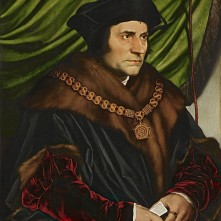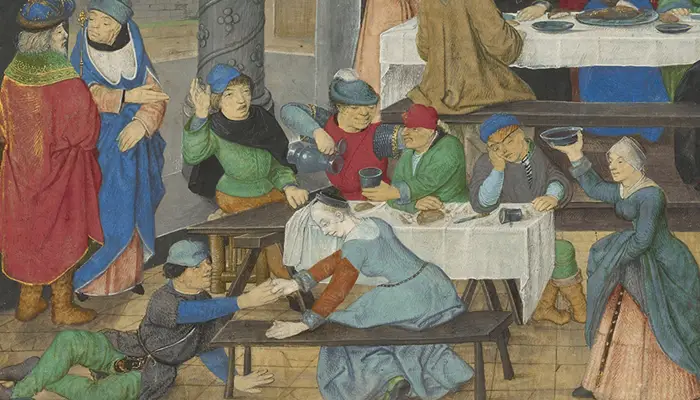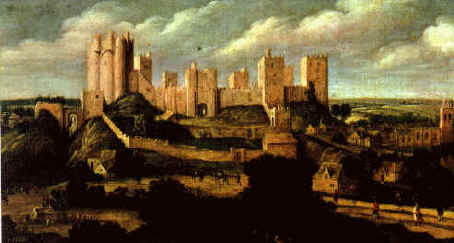26 October
1529 – Thomas More took his oath as Lord Chancellor. In Letters and Papers, it states: "and on the next day, Tuesday, 26 Oct., More took his oath as Chancellor in the Great Hall at Westminster, in presence of the dukes of Norfolk and Suffolk, Th. marquis of Dorset, Hen. marquis of Exeter, John earl of Oxford, Hen. earl of Northumberland, Geo. earl of Shrewsbury, Ralph earl of Westmoreland, John bishop of Lincoln, Cuthbert bishop of London, John bishop of Bath and Wells, Sir Rob. Radclyf, viscount Fitzwater, Sir Tho. Boleyn, viscount Rocheforde, Sir Wm.Sandys, Lord and others."
1536 – The rebels of the Pilgrimage of Grace halted at Scawsby Leys near Doncaster, where they met troops captained by the Duke of Norfolk. The rebels were said to number around 30,000 and Norfolk’s army only a fifth of the size, but Robert Aske chose to negotiate, and a deal was eventually struck, with Norfolk giving promises from Henry VIII that their demands would be met and that they would be pardoned. Aske then dismissed his troops. Unfortunately, Henry VIII later broke his promises to the rebels.
1538 – Geoffrey Pole, brother of Cardinal Reginald Pole and son of Margaret Pole, Countess of Salisbury, was interrogated in his prison at the Tower of London regarding letters he and his family had received from his brother, and words which he had uttered showing his support for the Cardinal, who had denounced the King and his policies in his treatise, Pro ecclesiasticae unitatis defensione.
1559 – Death of Sir Robert Southwell, lawyer and member of Parliament. It is thought that he was buried in Kent, probably near his seat of Mereworth. Southwell's offices included High Sheriff of Kent and Master of the Rolls. As High Sheriff of Kent in Mary I's reign, Southwell was active in putting down Wyatt's Rebellion of 1554.
27 October
c.1467 – Desiderius Erasmus, humanist, Catholic priest, classical scholar and theologian, was born on the night of the 27th/28th October in Rotterdam. His works included Enchiridion militis Christiani, or the Handbook of the Christian Soldier (1503), The Praise of Folly (1511), Institutio principis Christiani (1516) and Sileni Alcibiadis (1515).
1526 – Bishop Cuthbert Tunstall presided over the burning of Lutheran books, such as William Tyndale’s New Testament, at St Paul’s. He had issued an edict commanding that copies of the English New Testament should be found and delivered to him because members of Luther’s sect had "translated the new Testament into our English tongue, entermedling there with many heretical articles and erroneous opinions... seducing the simple people."
1532 - Anne Boleyn and her ladies, all in masks, made a dramatic entrance to the great banquet held by Henry VIII in Calais for Francis I. Click here to read more on this.
1538 – Baptism of Sir John Brograve, lawyer and member of Parliament, at St Mildred Poultry, London.
1561 – Birth of Mary Herbert (née Sidney), Countess of Pembroke, writer and literary patron, at Tickenhall, near Bewdley in Worcestershire. She was the daughter of Sir Henry Sidney and his wife, Mary (née Dudley), daughter of John Dudley, Duke of Northumberland, and sister of the poet Sir Philip Sidney. She married Henry Herbert, 2nd Earl of Pembroke, in 1577. Her known works include her Psalmes, her translations A Discourse of Life and Death and Antonius, and A dialogue between two shepherds, Thenot and Piers, in praise of Astrea, which was a pastoral dialogue written in praise of Elizabeth I.
28 October
1479 – Birth of Sir John Gage, courtier, at Burstow in Surrey. Gage served Henry VIII, Edward VI and Mary I, and his offices included Privy Councillor, Comptroller of Calais, Chancellor of the Duchy of Lancaster, Comptroller of the Household, Constable of the Tower and Lord Chamberlain.
1532 – The last full day of Henry VIII and Anne Boleyn’s time with Francis I in Calais. This included a chapter of the Order of the Garter and a wrestling match, which saw the English Cornish wrestlers beat the French side. This time, Henry VIII refrained from challenging the French king to a wrestling match, something he had done at the 1521 Field of Cloth of Gold.
1561 – Death of Sir Rowland Hill, merchant and Lord Mayor of London. He was buried in the church of St Stephen Walbrook.
1570 – Death of Thomas Causton, composer, in London. It is thought that he was a chorister in Cardinal Wolsey's household and a Gentleman of the Royal Household Chapel from 1550. His works included some metrical psalms which were published by John Day in 1563 in Whole Psalmes in Foure Partes, and also in Certaine Notes.
1571 – Death of William Parr, Marquis of Northampton and brother of Queen Catherine Parr, at Thomas Fisher’s house in Warwick. He had suffered from severe gout. Parr was laid to rest on 5th December in St Mary’s Church, Warwick.
29 October
1532 – Henry VIII accompanied Francis I to the border between English Calais and France to bid farewell to him.
1586 – Four days after a commission had found Mary, Queen of Scots guilty of conspiring to assassinate Elizabeth I, Parliament met to discuss Mary’s fate. They decided that they should petition the Queen for Mary’s execution.
1605 – Death of George Clifford, 3rd Earl of Cumberland, courtier and naval commander, at the duchy house, near the Savoy in London. He was buried in the family vault in Holy Trinity Church, Skipton, near Skipton Castle. Clifford was Elizabeth I's second champion. He commanded a ship in the Anglo-Spanish War, and is known for capturing Fort San Felipe del Morro in San Juan, Puerto Rico, in 1598. Elizabeth I nicknamed him her “rogue”.
30 October
1485 - The founder of the Tudor dynasty, Henry Tudor, was crowned King Henry VII at Westminster Abbey.
The Tudor chronicler, Raphael Holinshed, recorded:
"...with great pompe he rowed unto Westminster, & there the thirtith daie of October he was with all ceremonies accustomed, anointed, & crowned king, by the whole assent as well of the commons as of the nobilitie, & called Henrie the seaventh of that name..."
His biographer, Thomas Penn, describes how this was the occasion that Henry was united with his mother, Lady Margaret Beaufort, whom he'd not seen for fourteen years. Margaret was said to have "wept marvellously".
Henry Tudor had claimed the crown of England after defeating Richard III at the Battle of Bosworth Field on the 22nd August 1485, and had actually been unofficially crowned with Richard's crown on the battlefield that day.
31 October
1491 – Henry VII's son, Henry (the future Henry VIII), was created Duke of York.1517 – Martin Luther wrote to Albert, Archbishop of Mainz, and the Bishop of Brandenburg protesting against the sale of indulgences and sending them a copy of The Ninety-Five Theses (proper title: Disputation of Martin Luther on the Power and Efficacy of Indulgences).
According to Philipp Melancthon, “Luther, burning with passion and just devoutness, posted the Ninety-Five Theses at the Castle Church in Wittenberg, Germany at All Saints Eve, October 31”, rather than sending them in a letter, but no other contemporary source supports this.
1537 – Death of Lord Thomas Howard, second son of Thomas Howard, 2nd Duke of Norfolk, and his second wife, Agnes Tilney, in the Tower of London. He was buried at Thetford Abbey. Howard had been imprisoned in 1536 after becoming betrothed to Lady Margaret Douglas, the King's niece, without the King's permission.
1557 – Death of Sir Nicholas Hare, lawyer, Speaker of the House of Commons and Master of the Rolls. He was buried in Temple Church, London. Hare is known for presiding over the trial of Sir Nicholas Throckmorton for high treason, after Wyatt's Rebellion, and actually arguing with the accused. Throckmorton stated that it was Hare who had influenced his dislike of the proposed marriage between Mary I and Philip of Spain, and Hare reacted by refusing to examine one of the witnesses. Throckmorton was acquitted.
1612 – Death of Sir Christopher Yelverton, judge and Speaker of the House of Commons, at the age of seventy-five. He was buried at Easton Maudit Church.
1 November
1456 - Edmund Tudor, 1st Earl of Richmond, died from the plague at Carmarthen Castle. Edmund was the son of Owen Tudor and Catherine of Valois, and the father of Henry VII. He was buried at the monastery of Greyfriars in Carmarthen, but was moved to St Davids Cathedral on the orders of his grandson, Henry VIII, after the dissolution of the monastery.
1527 – Birth of William Brooke, 10th Baron Cobham, courtier and diplomat. He was the son of George Brooke, 9th Baron Cobham, and his wife, Anne (née Bray). Cobham was a close friend of William Cecil, and so became powerful in Elizabeth I's reign. He served as Lord Warden of the Cinque Ports, Privy Councillor and Lord Chamberlain. Cobham also undertook diplomatic missions.
1530 – Henry VIII sent Sir Walter Walsh (some say William Walsh) with Henry Percy, Earl of Northumberland, to Cawood Castle to arrest Cardinal Thomas Wolsey for high treason. They arrived on 4th November and took him into custody.
1558 – Death of Michael Throckmorton, agent for Cardinal Reginald Pole, probably at Mantua in Italy. He studied law in Italy, in Padua, in 1533 before becoming Pole's secretary. It is thought that he may well have been the agent who took Pole's Pro ecclesiasticae unitatis defensione to Henry VIII in 1536.










Leave a Reply